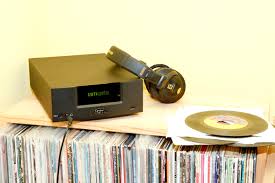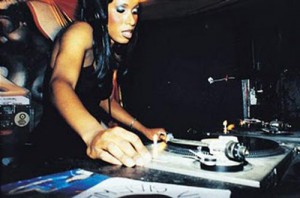Experts, Dads, and Technology: Gendered Talk About Online Music
This post is part of a partnership with the International Journal of Cultural Studies, where authors of newly published articles extend their arguments here on Antenna.
 At the moment, the Internet is overflowing with new music streaming services. Spotify, Wimp, Beats Music, and Deezer are only a few examples from a popular media format for finding and listening to music. The business idea is to sell subscriptions for the services, containing a large selection of music. The person subscribing can then personalize the collections by making their own playlists and saving favorites on the streaming service. No files are downloaded, but the data is streamed and if payment stops, the access to music will disappear. At the same time, music blogs and file sharing are still available sources of music online, complementing rather than competing with the streaming services.
At the moment, the Internet is overflowing with new music streaming services. Spotify, Wimp, Beats Music, and Deezer are only a few examples from a popular media format for finding and listening to music. The business idea is to sell subscriptions for the services, containing a large selection of music. The person subscribing can then personalize the collections by making their own playlists and saving favorites on the streaming service. No files are downloaded, but the data is streamed and if payment stops, the access to music will disappear. At the same time, music blogs and file sharing are still available sources of music online, complementing rather than competing with the streaming services.
While young adults participating in interviews about their music use online are overwhelmingly positive regarding the availability of music on the internet today, they also argue that it can be hard to find the music they want to listen to since the amount of music online is endless. The role of guidance—through the streaming services’ interfaces as well as by named experts, music nerds, and persons knowledgeable about technology—is therefore perceived as important. Perhaps the experts take on an even more important role today because of the enormous access to all kinds of music?
Expertise in the area of music and technology has often been ascribed to men and understood as being something masculine. Through the history of popular music artists, producers, journalists, and listeners, those valued as good and important have often been men. Roles as experts like talent scouts and music journalists who have influenced what can be labeled ‘good music’ have contributed, through their positions, to symbolically rule the taste of the music industry. To fill these roles, persons have often been men/masculine and expected to be men/masculine. While women and femininity—especially sexy femininity—has always been used to sell records, music promoted with femininity has often been devalued. So has, often, music defying gender binaries in different ways. This can also be said about music by racialized others and music loved by the working class—music that has not been considered ‘good’ by contemporary critiques. Many devalued genres have been reconsidered and reevaluated in a later historic time, such as jazz and Motown. Much like the role of the music expert or music nerd, the technologically savvy person is often understood as man or masculine. In the area of music, the high fidelity lover building his own speakers as well as the home producer, using computers or a home studio to produce his own music, are known figures—figures that combine technological skills with masculinity and music knowledge.
Thus, when the expert with particular and technological competence in general is regarded as important in order to find and listen to music online today, the field of music consumption is gendered. It is not gendered in a simplistic way—not all experts and technologically savvy persons are men—but when young music consumers talk about music listening online, they understand expert roles and technological competence as something masculine. Interviews show that the persons ascribing technological knowledge to themselves, and using specialist jargon when discussing hardware and software for music listening, were mostly, but not only, men. Also, when asked who had influenced their music taste or who gave them music, dads were mentioned in many interviews, and many young women referred to boyfriends, while moms were less frequently brought up, and girlfriends were not mentioned as musical influences at all.
On streaming services that are presently popular, there may be named and appointed experts fore-fronted in the interface. But there are also algorithms recommending music to listeners and these are not neutral engines. The services are often connected to other social networks (such as Facebook) where your friends may pose as experts. What may at first seem like vast libraries of music are really services spreading opinions, pictures, sounds, and ideas collected from other media, software, and famous, as well as ordinary, people.
 It is beyond doubt that women today use the internet for all purposes, including music consumption and gaming (another form of popular culture associated with masculinity). Still experts, music nerds, dads, and boyfriends are points of reference when it comes to good music and technological knowledge. How can this contradiction be understood? The idea that equality is promoted automatically in online cultures—since everybody has access and thus the ability to reach the same position—is clearly incorrect. While digital media permeates our society in new ways, the power imbalances in terms of who is considered an expert in online music use seem familiar. I would even take this reasoning one step further: the expert plays a highly central role for music consumption online, as the interviewees believe. Experts guide others by recommending new music, creating playlists, and writing music blogs. Could the expert be getting even more important in digital music use? If that is the case, and experts are still in different ways perceived as masculine, then guidance for music-use online may be doing the opposite of promoting equality: reinforcing differences.
It is beyond doubt that women today use the internet for all purposes, including music consumption and gaming (another form of popular culture associated with masculinity). Still experts, music nerds, dads, and boyfriends are points of reference when it comes to good music and technological knowledge. How can this contradiction be understood? The idea that equality is promoted automatically in online cultures—since everybody has access and thus the ability to reach the same position—is clearly incorrect. While digital media permeates our society in new ways, the power imbalances in terms of who is considered an expert in online music use seem familiar. I would even take this reasoning one step further: the expert plays a highly central role for music consumption online, as the interviewees believe. Experts guide others by recommending new music, creating playlists, and writing music blogs. Could the expert be getting even more important in digital music use? If that is the case, and experts are still in different ways perceived as masculine, then guidance for music-use online may be doing the opposite of promoting equality: reinforcing differences.
[For the full article, see Ann Werner and Sofia Johansson, “Experts, Dads and Technology: Gendered Talk About Online Music,” forthcoming in International Journal of Cultural Studies. Currently available as an OnlineFirst publication]
Ann Werner is Senior Lecturer at Södertörn University, Sweden


